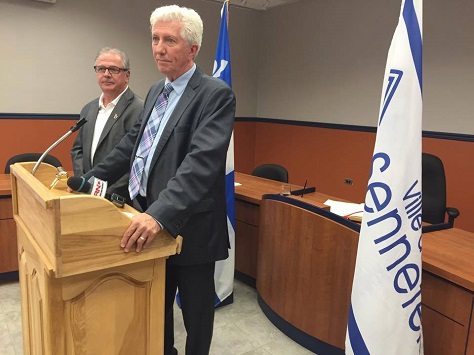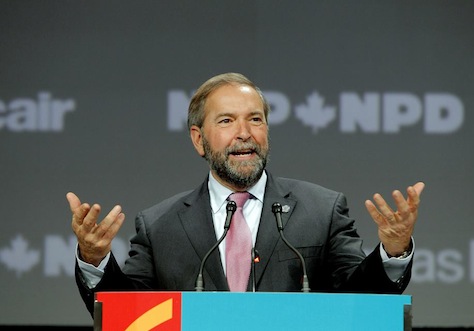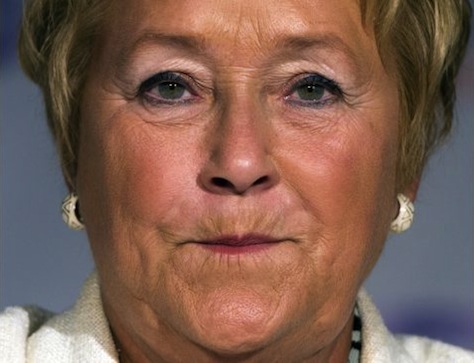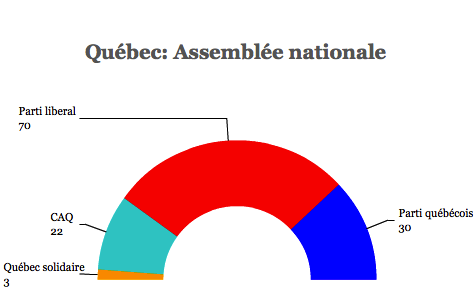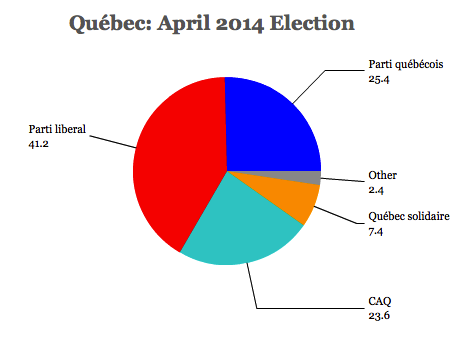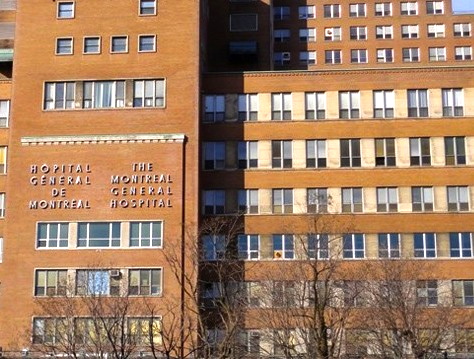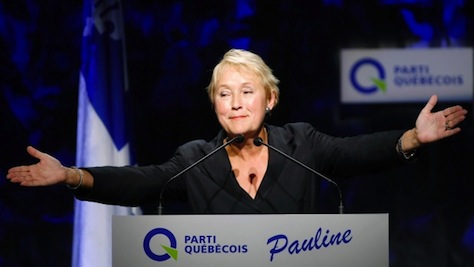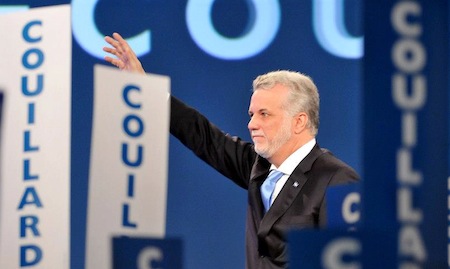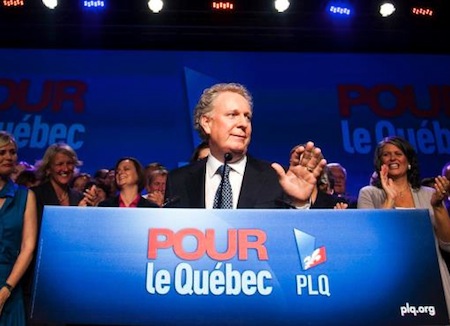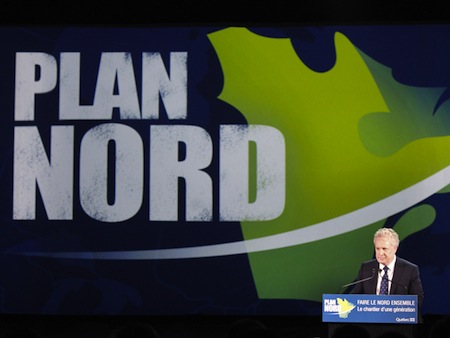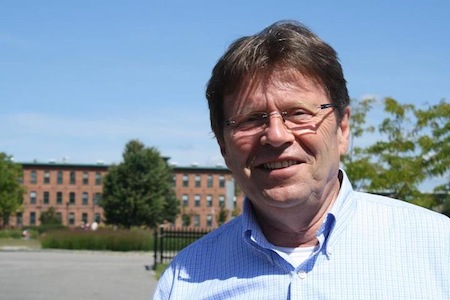
One year into the minority government of Québec premier Pauline Marois, the province is again at the center of controversy with a new attempt to legislate a ‘charter of Québec values’ that’s drawing ire from the rest of Canada. 

That chart above isn’t a joke — it was released yesterday by Québec’s government, and it purports to demonstrate examples of ‘non-ostentatious’ signs that state employees are permitted to wear.
You’ll note that two-thirds of ‘approved’ examples are Judeo-Christian religions and three-fifths of the ‘banned’ examples are not. The ‘secular charter’ (la charte de la laïcité) would ban public sector workers from wearing kippas, turbans, burkas, hijabs or ‘large’ crucifixes. Remember that in Québec, the public sector is quite expansive, so the charter would capture not only folks like teachers, police and civil servants, but employees in Québec’s universities and health care sector as well.
For good measure, the proposed charter would also tweak Québec’s Charter of Human Rights and Freedoms to limit religious exemptions, though it wouldn’t eliminate subsidies to religious private schools in Québec that are largely Catholic and largely funded by the state and it wouldn’t eliminate property tax exemptions for churches and other religious buildings.
In short, the charter looks less like a secular bill of rights than a sop to French Canadians to perpetuate preferred legal and cultural benefits at the expense of other ethnic and religious groups — tellingly, the crucifix hanging in Québec’s provincial assembly would be exempt from the law. A charter that, at face value, purports to secularize Québec’s society, would actually enshrine the dominant Catholic French Canadian culture and exclude Canada’s growing global immigrant population from many of the religious freedoms typically associated with a liberal democracy. If passed into law, it would conflict with the religious freedom guaranteed in Canada’s Charter of Rights and Freedoms (essentially, Canada’s bill of rights) — Québec did not sign the federal Charter, nor did it approve of the 1982 constitutional settlement, but remains subject to the federal Charter. That means the ‘secular charter’ could once again put Québec on a collision course with the rest of Canada.
It’s also the latest salvo in a series of only-in-Québec culture-war misfires that have plagued the Marois government since it took power last year, and it goes a long way to explaining why Marois and the sovereignist Parti québécois (PQ) are in danger of losing the next election.
Over the past year, it would have been enough for Marois to declare victory on the issue of student fees and largely pacifying student protests, to declare that her government would largely continue Charest’s Plan Nord, a push to develop Québec’s far north in pursuit of resources over the coming decades, and to focus on bringing investment and jobs to Québec. Marois’s government has also pushed to end support for Québec’s notorious asbestos industry, winning plaudits from environmentalists.
But if you want to know why Marois’s minority government isn’t in a more commanding position, it’s because it has pursued language and culture legislation as a time when Québec, which wasn’t exactly Canada’s most growth-oriented province to begin with (its per-capita GDP of around CAD$43,400 is CAD$5,500 less than neighboring Ontario’s and a staggering CAD$35,000 less than resource-rich Alberta), is falling behind the rest of Canada.
Between August 2012 and August 2013, Canada’s unemployment rate has dropped from 7.8% to 7.6%, but in Québec, the unemployment rate rose from 7.8% to 8.1%.
Instead, her government has plunged Québec back into the language wars, drawing ridiculous global headlines — a great example is the crackdown of the Office québécois de la langue française against a Montréal Italian restaurant’s use of the word ‘pasta’ and other Italian words on its menu and demanding the restaurant print their French equivalents more prominently. (Though we all know that apéritif or hors-d’œuvre is not the same thing as antipasto are not the same thing).
It comes after the Marois government has largely given up its year-long fight to pass Bill 14, which would amend Québec’s La charte de la langue française (Charter of the French Language, also known as ‘Bill 101’) by allowing the government to revoke a provincial municipality’s bilingual status if the anglophone population falls below 50%, requiring small businesses (of between 26 and 49 people) to use French as their everyday workplace language, and mandating that all businesses that serve the public use French with customers.
Marois switched gears from the language charter to a new religious charter when it became clear that her minority government would have a hard time pushing Bill 14 through, but also because a ban on religious symbols is relatively popular among the Québécois electorate. Continue reading The problem with Pauline Marois’s sovereignist minority government in Québec →
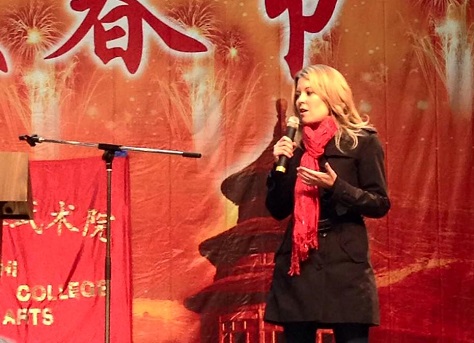
![]()

